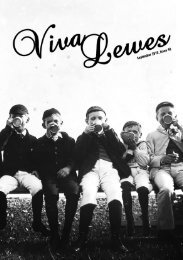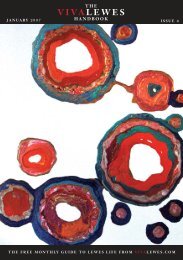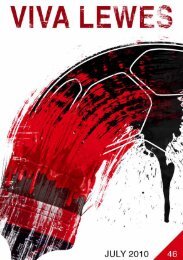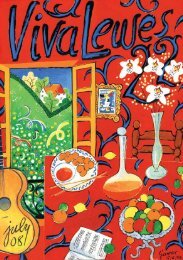Create successful ePaper yourself
Turn your PDF publications into a flip-book with our unique Google optimized e-Paper software.
Photo by alex Leith<br />
I meet Melanie Cutress, the<br />
Chair of Falmer’s Parish Council,<br />
at Falmer station’s car park. She’s<br />
agreed to give me a guided tour<br />
of the village. It’s Friday 15th July,<br />
the day before the first match<br />
at the 22,000-capacity Amex<br />
Stadium, and the vast structure,<br />
a kind of shiny Frank Gehry-like<br />
affair with wild curves, looms<br />
over us as we shake hands.<br />
Melanie has lived in Falmer for<br />
30 years, and almost exactly that<br />
period of time has passed since<br />
my previous visit to the village<br />
proper. That was a trip to The<br />
Swan, very soon after the A27<br />
was widened and Falmer was<br />
effectively split in two: Falmer<br />
North, where the pub is; and<br />
Falmer South, where you can find<br />
the church and village pond.<br />
“The road widening was in 1978,<br />
before I came to live here, so it<br />
wasn’t my fight,” says Melanie,<br />
who was part of the team which<br />
contested the location of the<br />
stadium in the village, over a<br />
period of six or seven years.<br />
There have been plenty of other<br />
fights, for Falmer residents, over<br />
the last fifty-odd years, what with<br />
the construction of the teacher<br />
training college (now Brighton<br />
Uni) in the 50s, the arrival of<br />
the University of Sussex in 1961,<br />
the increase in traffic due to the<br />
construction of the Brighton<br />
by-pass in 1988, and finally the<br />
stadium, first mooted in 2001,<br />
and subject to two national-level<br />
public enquiries.<br />
We cross the bridge over the<br />
roaring road, and stop by Falmer’s<br />
pond and church. ‘Falemere’ is<br />
recorded in the Domesday Book,<br />
I learn, and as ‘mere’ means<br />
‘dark pool’ it’s probable that<br />
the pond has been there at least<br />
since Saxon times. It’s a beautiful<br />
sight, reflecting the crenellated<br />
19th-century church in its rippled<br />
surface, and dominated by an<br />
enormous willow sitting on an<br />
island in the middle. It attracts<br />
a surprising number of visitors,<br />
I’m told. We watch an old couple<br />
attempting to feed a graceful<br />
family of geese with bread out of<br />
a Tesco bag, but only succeeding<br />
in sating the appetites of a<br />
determined mob of seagulls. The<br />
scene somehow encapsulates the<br />
village’s current predicament.<br />
I was brought up in Kingston,<br />
where my parents still live,<br />
so Falmer is an old next-door<br />
neighbour, of sorts. I’m rather<br />
shocked, then, to realise that I’ve<br />
never visited this spot before, and<br />
know next to nothing about the<br />
village. Over the next half hour,<br />
I learn a lot. The population of<br />
Falmer is about 120, I’m told,<br />
in 70 houses, of which half are<br />
rented. 26 of these buildings<br />
are listed, and you can see why:<br />
there’s a fine array of sturdy flint<br />
affairs, handsome rather than<br />
pretty, in an L-shape either side<br />
of the church. There is also a<br />
magnificent medieval thatched<br />
barn, hidden from view, tucked<br />
behind the church and reputed to<br />
be the largest in Sussex.<br />
We move to a bench in Melanie’s<br />
front garden, and she tells me,<br />
over tea and biscuits, about the<br />
long, drawn-out battle against<br />
the football club, which cost the<br />
parish council £60,000 (on top<br />
of the £250,000 spent by <strong>Lewes</strong><br />
District Council). She’s fairly<br />
sanguine about the whole affair,<br />
now, and seems to have come to<br />
terms with her new neighbours,<br />
v i v a v i l l a g e s<br />
though she remains apprehensive<br />
about what life will be like when<br />
the matches start. She’s worried<br />
about the noise, and the traffic.<br />
She thinks the stadium to be<br />
an ‘attractive modern building<br />
of very good design’, though,<br />
and doesn’t think it jars with its<br />
environment, except from one<br />
stretch of the Woodingdean<br />
Road, where it ‘looks like a<br />
spaceship that’s been dumped in<br />
some fields’.<br />
We say goodbye, and I wander<br />
round taking pictures, and have<br />
lunch in the pub, where I chat<br />
to mother-and-son owners<br />
Linda and Martin, who were<br />
gobsmacked last year when they<br />
were told, after the death of<br />
the pub’s long-term landlord,<br />
that he had given it to them in<br />
his will. They are determined<br />
to make a good go of it, but<br />
unsure as to how much the pub<br />
will be affected by the arrival of<br />
the stadium, and the home and<br />
away fans it will attract, from as<br />
far afield as Leeds, Cardiff and<br />
Middlesbrough. “We can’t make<br />
it go away,” says Linda. “So we’ve<br />
got to make the most of the<br />
situation.”<br />
I walk to the station, over the<br />
Woodingdean Road, a process<br />
made much easier than it would<br />
have been a few weeks back by<br />
the installation of a new set of<br />
traffic lights, to facilitate traffic<br />
flow to the stadium. On the way I<br />
make two purchases, one of which<br />
makes me feel rather guilty: four<br />
shiny apples from the farm shop<br />
of the edge of the village, and,<br />
dropping down the valley to the<br />
bustling-with-workmen stadium,<br />
two tickets for the next day’s<br />
match. Alex Leith<br />
8 7












